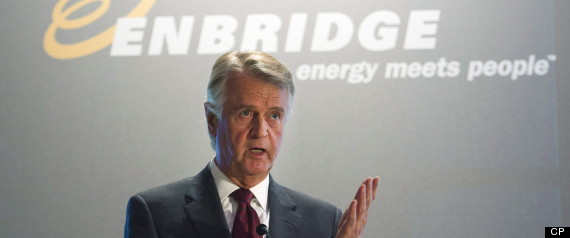 CALGARY - Enbridge Inc. and a partner are planning to spend up to US$3.4 billion to reconfigure a natural gas pipeline to carry oil to the eastern Gulf Coast, a market that currently relies on rail and barge for crude shipments.
CALGARY - Enbridge Inc. and a partner are planning to spend up to US$3.4 billion to reconfigure a natural gas pipeline to carry oil to the eastern Gulf Coast, a market that currently relies on rail and barge for crude shipments.Enbridge (TSX:ENB) and Dallas-based Energy Transfer Partners would each own 50 per cent of the project, which would stretch more than 1,100 kilometres from an oil hub at Patoka, Ill., to the St. James hub in Louisiana.
Each company would invest between $1.2 billion and $1.7 billion in the project and Energy Transfer would operate it.
The line is expected to be in service by 2015, likely carrying between 420,000 and 660,000 barrels per day of crude.
The proposal, which requires U.S. regulatory approvals to go ahead, is one of many to help move more crude from Alberta's oilsands and the Bakken, an oil-rich rock formation centred in North Dakota, to the U.S. Gulf Coast.
Canadian crude has recently been sold at a bigger discount than usual because of a lack of pipeline capacity out of western Canada and the U.S Midwest. Burgeoning Bakken volumes, unlocked by drilling advances, have compounded the problem.
There is a "tremendous" demand for Bakken crude in the Louisiana market, with some 400,000 barrels per day moving there mainly by rail, said Steve Wuori, the Enbridge executive in charge of oil pipelines.
Smaller heavy volumes move there by barge along the Mississippi River.
Wuori says he sees the St. James market taking both types of crude.
Refineries in the western Gulf Coast — Texas — are mainly configured to handle heavier oil, and a number of initiatives are underway to bring oilsands crude there.
Enbridge CEO Al Monaco said that market is "screaming" for more heavy oil to supplant dropping volumes from Venezuela and Mexico. Enbridge and Houston-based Enterprise Products Partners have reversed the Seaway pipeline between Oklahoma and Texas and expect a major expansion to be in service next year.
Between initiatives to tap the eastern and western Gulf markets, Wuori said he sees tankers of crude from Venezuela, Saudi Arabia and elsewhere having to look for other customers.
"Inevitably with greater, greater and greater American and Canadian supply, that's going to back out those imports," he said.
And that should help narrow the price gap between American and global crude benchmarks, Wuori added.
"Differentials are funny things, but the market is very efficient at removing large arbitrages and I think that's what you're going to see happen as we move those volumes there."
On a conference call to discuss Enbridge's fourth-quarter results, one analyst asked if today's pipeline pinch could be reversed into a pipeline glut within the next few years, as a litany of Gulf Coast-bound projects come on stream.
"We are definitely tight right now and I would say that by 2015-16 when we finish our initiatives and some others get done by others, I think that we'll probably be in balance by that time," Monaco replied.
Wuori added that Enbridge intends to take a "surgical approach" to deciding where to build pipe.
The eastern Gulf project, he said, "is really designed to take what is currently a rail and water market and make it a pipe market. There's very little crude that can move by pipe into that market. It ought to be a pipeline market. It will be a pipeline market just like the western Gulf Coast."
On the other hand, it wouldn't make sense to build pipe to the Philadelphia market, since it's better suited to take crude shipments by tanker and rail.
The key, Wuori said, is to give customers "optionality."
"Who knows where all the various crudes are going to need to go? Who knows what differentials are going to do?"
The latest proposal would redeploy a variety of existing pipelines, including part of Energy Transfer's Trunkline natural gas system, as well as Enbridge's new Southern Access Extension, which is under development.
The safety and environmental impact of oil pipelines has come under increased scrutiny in recent years, particularly after a major spill from an Enbridge pipeline into Michigan's Kalamazoo River in 2010.
Environmentalists, local politicians, landowners and First Nations communities have raised objections to several major projects, including Enbridge's Northern Gateway and TransCanada's Keystone XL.
Keystone XL would carry crude and oilsands bitumen from Canada and the northern United States to southern refineries while Enbridge's Northern Gateway would link Alberta producers to export terminals on the B.C. coast.
Also on Friday, Enbridge reported fourth-quarter net earnings of $146 million, or 18 cents per diluted share, down from $159 million, or 21 cents per share a year earlier.
Adjusted for one-time items, earnings were $327 million, or 42 cents per share, compared to $273 million, or 36 cents per share.
Revenues were $7.2 billion, a drop from $7.3 billion.
Enbridge shares rose 38 cents to $44.51 in afternoon trading on the Toronto Stock Exchange.
Original Article
Source: huffingtonpost.ca
Author: Lauren Krugel
No comments:
Post a Comment